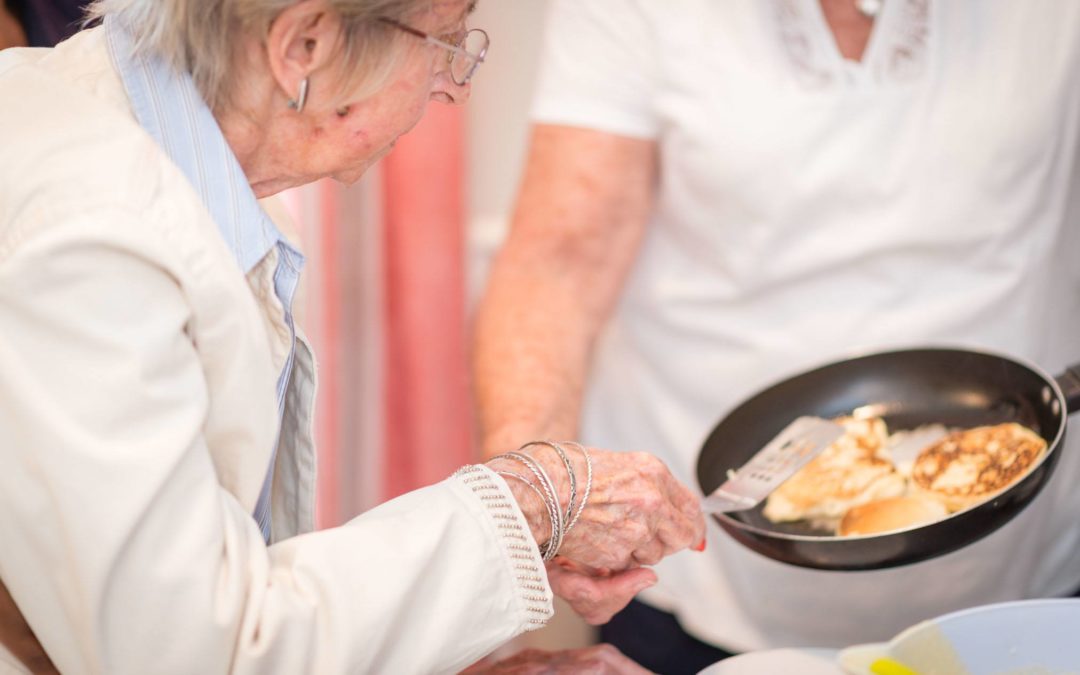Few people are aware of the difficulties mealtimes may present for those living with Alzheimer’s disease and other forms of dementia and those caring for them in the home environment. Ensuring that the nutritional needs of elder people are met is an important aspect of caring for people with dementia and, with a little additional effort and understanding, meals can be an enjoyable part of life that also assist in supporting the individual’s wellbeing.
“When caring for people living with dementia, it is important to also keep in mind that one is also responsible for supporting the healthy aging of the individual in a broader sense,” notes Ivan Oosthuizen, chief executive officer of the Livewell Villages in Bryanston and Somerset West.
Particular attention should be paid to meal planning, which includes various considerations such as the nutritional requirements of older people according to their individual activity levels, the individual’s ability to safely chew and swallow solid foods, and the types of food that people with dentures can comfortably eat, as well as personal culinary preferences.
“Residents with more advanced dementia sometimes have difficulties with mealtimes that few people can imagine. Some people gradually lose the ability to master cutlery, while others may not be able to clearly distinguish between their plate, the food and the table, for instance. Occupational therapists, carers and other members of the Livewell team work together to find ways of overcoming these challenges,” he explains.

Mercy Tokoyo, kitchen team leader at the Livewell Village dementia care facility in Bryanston, says that mealtimes are important to residents and meals are prepared with special care to ensure the food is both delicious and nutritious. Some residents enjoy getting involved in the kitchen activities, and will either request the kitchen staff to make a favourite recipe for them, or take part in baking or food preparation activities.
Mercy Tokoyo, cook and kitchen team leader at the Livewell Village dementia care facility in Bryanston, says seasoning is particularly important when catering for senior citizens because the taste buds and sense of smell of older people tend to be less sensitive than younger people.
“For health reasons, we are careful to limit the amount of salt in the food we prepare. To ensure the meals we prepare are tasty and tempting, we use lots of fresh ingredients and pay particular attention to the blend of herbs and spices in our dishes. As a routine precaution, we always test the temperature of food and beverages before serving, so that residents can enjoy them without the risk of burning themselves.”
According to Tokoyo, if a resident does not have an appetite she puts considerable effort into coaxing them to eat by asking about their culinary likes and dislikes, and accommodating their preferences.
“When a new person comes to live here, sometimes it takes them a little while to start feeling at home and I know that good food can help a person to feel more settled in their new environment. We talk to the resident and their families to understand any dietary requirements they may have.
“We offer the people a choice between various dishes, and we soon discovered that a certain resident felt overwhelmed when asked to make a decision on her menu. To help alleviate her anxiety, we would suggest a particular meal and then take careful note of what she enjoyed most. Through a process of elimination, we were able to customise a menu to suit her tastes and now she eats heartily.”
“The residents’ dedicated carers also provide support at mealtimes, but as far as possible the residents are encouraged to eat independently, with a little help where required. We set the tables simply but elegantly, and we do not rush mealtimes here because we see how the residents like to savour their meals and enjoy the social aspect of sitting together while eating,” Tokoyo adds.
Tokoyo joined Livewell when it acquired the five-star guesthouse Silverwood Manor, where she was previously employed, and developed it as the Bryanston Livewell Village.
“Our standard of cooking remains five-star, and we work with a dietician to ensure the residents are getting the ideal balance of nutrients to support their wellbeing. We prepare food in such a way that it is not difficult to chew or swallow. We either grind or cut the food into bite-size pieces or serve soft foods pureed or blended. We also receive ongoing training that equips all staff members to consider the specific needs of people with dementia, both in our cooking and in our interactions with residents.”
Tokoyo says that, just as with any domestic household, the kitchen and dining area at the village are a warm and inviting space where residents eat meals and socialise together, and often enjoy getting involved in the kitchen activities.
“Some residents have shared their favourite recipes with us, and it is wonderful to see how their faces light up when we present the meal to them. Others get great joy out of baking and helping us to prepare meals, and so we invite them to participate, although for safety reasons we are careful to make sure the kitchen staff do any heavy lifting and take the dishes out of the oven for them.”
Asked about the residents’ favourite meals, Tokoyo says prawns with lemon butter, chicken burgers and cottage pie are great crowd pleasers. “Often, their carers come and call us from the kitchen so that the people can give us their feedback on the food we prepare. Usually they are most complimentary, but we are always looking for ways to make meals more enjoyable for them.
“If a resident requests a particular dish, we will make it for them and this makes the person feel special – when we can achieve this with our cooking, we find it very rewarding.”
Oosthuizen says that the passion for pleasing residents demonstrated by kitchen team led by Mercy Tokoyo is indicative of Livewell’s approach to caring.
“Each meal is carefully considered and lovingly prepared with the individual residents in mind. The sense of satisfaction in the kitchen when the staff sees the plates coming back empty from the dining room shows the level of commitment to making each meal, and each moment, as special as can be for our residents,” he concludes.
